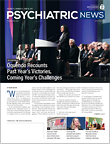Making use of an advanced machine-learning algorithm, a team of physicians and researchers has developed a DSM-5-based tool to screen adults for attention-deficit/hyperactivity disorder (ADHD).
The screen consists of just six questions, each with a numbered scale of severity (see sidebar). It is intended to offer health care providers a rapid, easily scored, and accurate diagnostic screen that can be used to refer someone for a more thorough evaluation.
“We hope that this tool will do for ADHD screening what the PHQ [Patient Health Questionnaire] has done for depression screening of adults in primary care settings,” said study co-investigator Lenard Adler, M.D., a professor of psychiatry and child and adolescent psychiatry at NYU Langone Medical Center.
Adler and his colleagues used the DSM-IV-based World Health Organization Adult ADHD Self-Report Scale (ASRS) as the template. The ASRS includes structured questions pertaining to each of the inattention and hyperactivity-impulsivity symptoms plus 11 questions related to problems in executive function that are associated with adult ADHD.
Ronald Kessler, Ph.D., the McNeil Family Professor of Health Care Policy at Harvard Medical School, told Psychiatric News that updating the ASRS to comply with DSM-5 was not difficult; ADHD’s core symptoms were not changed in DSM-5, just the number needed to qualify for a diagnosis (down to five from six) and the age of onset (now 12 years of age instead of 7).
The team analyzed data from hundreds of people who had taken the ASRS and then underwent a clinical interview to confirm an ADHD diagnosis.
The samples used included two distinct groups: one consisting of 327 participants from the general community (in which ADHD prevalence is low) and one consisting of 300 people who attended NYU Langone’s ADHD program (in which prevalence is much higher).
Adler said that including the Langone sample was important since it represents people whom primary care providers are most likely to encounter—adults who think they might have ADHD.
As for including a general population sample, Kessler said that the screen could also be used in workplace settings as part of a wellness program. Doing so might provide data demonstrating how undiagnosed ADHD affects productivity, which might encourage employers to invest in mental health services.
The screen has four questions that pertain to core ADHD symptoms and two that relate to deficits in executive function. The scale ranges from 0-24 points, with 14 or higher considered the most accurate cutoff for possible ADHD.
The DSM-5 ASRS performed well in both general and clinical populations, identifying more than 91 percent of true ADHD positives in each group. However, in the clinical sample, the test had a higher false positive rate than in the general sample—26 percent versus 4 percent. This was expected since the Langone group had more people with subclinical inattentive and/or hyperactive traits.
Timothy Bilkey, M.D., an Ontario psychiatrist who specializes in diagnosing and managing adults with ADHD, thinks that this screen will be valuable in identifying people for a fuller clinical evaluation.
“These are much like the questions I would ask in the first few minutes of a clinical interview to distinguish ADHD from symptoms that are related to a mood disorder or a substance use problem,” he told Psychiatric News.
One item not captured, though, was memory issues. “I call it PDF—procrastination, distractibility, and forgetfulness. These are three problems that need to be established in both adulthood and childhood” for a diagnosis of ADHD.
“Another concern is that this scale will most likely capture people already aware that they might have a problem,” Bilkey added. “But many adults have managed to get by with ADHD for years or decades and can be somewhat oblivious.” That’s why Bilkey encourages clinicians to take a collateral history of a patient with family or friends to confirm the severity of problems.
The DSM-5 ASRS Screening Scale was developed with support from Shire Pharmaceuticals. The details were published in the May 1 JAMA Psychiatry. ■
“The World Health Organization Adult Attention-Deficit/Hyperactivity Disorder Self-Report Screening Scale for
DSM-5” can be accessed
here. The accompanying editorial, “Good News for Screening for Adult Attention-Deficit/Hyperactivity Disorder,” is available
here.
